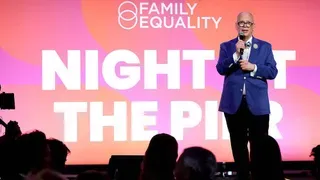September 2, 2013
$outhern Decadence: Not Just a Party, But a 'Green' Movement
Bobby McGuire READ TIME: 3 MIN.
NEW ORLEANS - The symbol of gay pride is a rainbow but if the Southern Decadence festival that draws to a close on this Labor Day proves anything it is that the ubiquitous "pride flag" could easily be the color of money.
Not that money is everything. It doesn't overshadow the political bully pulpit from which a president, in his second inaugural address, equates the 1969 Stonewall rebellion with other civil rights milestones; or five little words from a pope: "Who am I to judge."
But for years, the loosely organized conglomeration of music and street parties centered around the bawdy gay bar scene at St. Ann and Bourbon Street has been - whether by design or not - making the case that gay commerce is a very big deal.
Promoters of the celebration estimate that, in years when the weather cooperates, the economic impact on the city far exceeds $100 million. Promoters and police were expecting more than 125,000 participants this year.
Many of those people are visitors, filling hotel rooms at a traditionally slow time for tourism in a city dependent on travelers.
People who make a living in the tourism industry know this.
And, so, the U.S. Supreme Court's June decisions striking down part of the Defense of Marriage Act while upholding the right of gays to marry in California didn't just advance the cause of marriage equality. It inspired a new element to the gay travel market: the promotion same-sex honeymoons.
The New Orleans Convention and Visitors Bureau and the separate Greater New Orleans Tourism Marketing Corporation each are promoting honeymoon trip giveaways on social media. NOTMC is spending an estimated $200,000 in gay travel marketing on gay travel websites.
Southern Decadence, meanwhile, gets a mention on the decidedly mainstream sites of the two New Orleans tourist promotion agencies, where it is sometimes referred to as the "gay Mardi Gras."
While Decadence is welcomed by city officials, its popularity, obviously, its appeal isn't universal. It still draws street preachers raging against homosexuality. And, even in the gay community, it has its critics, says John Hill, a longtime Louisiana journalist, a gay activist and past chairman of the Forum for Equality.
"There's two lines of thought about this," says Hill, "One is that Decadence is a very good thing because it's a celebration of life. Another is that it plays to stereotypes."
Hill is among those in the former category.
"We're awfully glad that all of that money comes into this town."
Again, this kind of "green" movement doesn't address all of the issues driven by the gay, lesbian, bisexual and transgender community. And neither does Southern Decadence, where the crowd appears to be largely white gay men with disposable income.
Wesley Ware is director of an organization called BreakOUT, which advocates largely for young gays or transgendered women, often minorities, who find themselves on some of New Orleans' meaner streets. Their alleged mistreatment at the hands of police is one element of a federal court-backed reform plan for the New Orleans Police Department.
"Certainly marriage equality and adoption rights and those types of things are important wins," Ware says. "But they are not impacting our membership in the same way."
New Orleans police officials and Justice Department lawyers have met with BreakOUT and Forum for Equality members to address issues including allegations that some police officers have harassed and intimidated young gays and transgendered people.
It resulted in police issuing "Policy 402" during the summer: two pages of guidelines aimed at preventing biased policing, including the statement that a person's "actual or perceived gender identity, or sexual orientation" is not probable cause to suspect a crime.
"We really believe that by tackling those issues we are able to have a larger impact on the well-being of all LGBT people in this community," Ware said.




